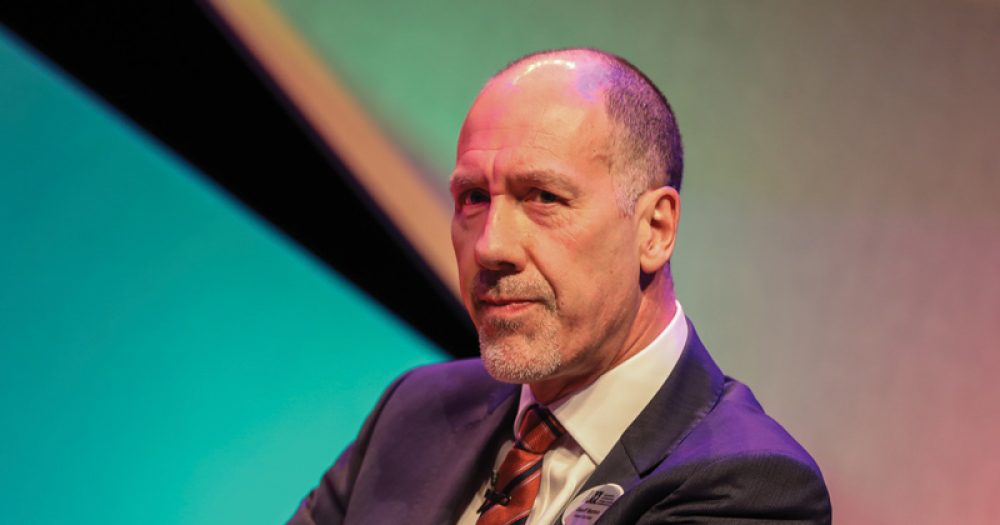The current system of school league tables stigmatises schools and penalises those with the most vulnerable pupils, union leader Geoff Barton has warned.
The ASCL general secretary told the union’s annual conference in Birmingham this morning that his organisation is “exploring a new approach to performance tables” in response to concerns from heads about the impact of accountability measures like progress 8.
His comments come amid growing disquiet about how schools with high numbers of disadvatanged pupils fare under progress 8. In January, new research showed that 40 per cent of schools labelled as underperforming saw their progress scores improve once pupil background was taken into account.
In his speech, Barton lashed out at former education secretary Michael Gove, quoting the Conservative politician’s famous criticism of unions and their “soft bigotry of low expectations”.
“How much value is there in a system in which some schools – those in the most disadvantaged areas – are always most likely to fare the worst?” said Barton.
“Is pointing out this fact really the ‘soft bigotry of low expectations’? Or is the reality that the current system stigmatises schools, making it harder to recruit the very teachers and leaders who would help to secure improvement, whilst demoralising families and communities in the process?”
He questioned the value in a system “which penalises schools with the most vulnerable learners”, and warned vulnerable pupils were excluded or off-rolled “too easily” under the current system.
“Whilst it might be true that progress 8 is the best accountability measure we’ve had – or at least the least bad one we’ve had – we want to explore what ‘inclusive accountability’ might look like,” he said.
“That means a system that is not built on the demeaning foundations that for one institution to do better another one has to do worse, where instead there’s recognition of those leaders who look beyond the territory of their own school gates and work to ensure the quality provision for our most vulnerable young people, those too easily marginalised, excluded or off-rolled.”
Describing accountability as “an ugly word that’s used far too much when we talk about education”, Barton warned that heads have “allowed accountability to mean something that was done to us by other people”.
“We let performance measures and inspection somehow become a spurious shorthand for education.
#”And in the process perhaps we forgot what matters most, and certainly what parents and carers most want from schools and colleges – children who are safe, happy, a broad and balanced curriculum, getting good results as a stepping stone into the future, and gaining an opportunity from reliable adults on how to become citizens of the future.”
However, he repeated his praise of Ofsted’s new inspection framework, which he said was a “step towards” the future of inspection headteachers want to see.
Amanda Spielman, Ofsted’s chief inspector, is due to address the conference shortly after 3pm today. It will be her first large-scale public audience with school leaders since the new draft inspection framework was published.
“The future may well be one in which Ofsted inspections figure less in our routine conversations, where current grading disappears, where intelligent and rigorous self-review of schools and colleges becomes the norm, trusted by parents for its objectivity, thereby leaving Ofsted to focus on supporting institutions that need greater support,” said Barton.
“We believe the new incarnation of the inspection framework is an important step towards that.”








As always, totally agree with Geoff Barton’s sentiments.
But he will know well the phrase: “fine words butter no parsnips”.
When you are a leader, you have to lead. Please start buttering the parsnips!
I’m a governor at a special school. Fully agree with Mr Barton’s opinion. At our last inspection the inspector could not get beyond “outcomes” to look at context. Progress is measured by officialdom as “academic progress”, hard to swallow when see your your SLT and it’s students fighting hard to overcome SEMH issues. Sometimes just getting to the academic starting line is a victory..
Don’t get me started on mobility – where a large proportion of our students arrive at the school after Y7, naturally experiencing difficulty settling in, resulting in disruption to their cohort at the new school, disengaged from their neighbourhood friends during the school day etc. etc.
I’m sure schools would be much happier if they could evaluate themselves, but first they have to show that they can deal with the following:-
1) OFSTED state that 10% of schools appear to be offrolling and these cluster in areas,. This makes sense because if School A dumps its unwanted pupils on School B, then School B either do the same or see their figures go down. So they do, and then School C almost has to follow.
2) Damien Hinds has spoken of pre-emptive offrolling where schools simply refuse to take pupils with EHCP’s and make up stupid excuses to do so (eg, no-one available to meet young person from school bus for first 2 weeks of term.) Also see Jess Phillips’s email from her child’s school where they say they are ‘rethinking their policy on pupils with SEND.’ This is a breach of the statutory SEND code of practice and the Equality Act. Again, it will cluster in areas.
3) Flattening the grass…
4) Illegal exclusions, cooling off periods, educated off site.
5) No effective complaint system for parents and students. A school with a culture as described above is unlikely to bother with the truth when dealing with complaints because they don’t want the pupil anyway.
We put an enormous amount of trust in schools, and 90& of them deserve it. The other 10% do not, and the teaching unions need to acknowledge that a small minority of SLT are disgracing their profession.